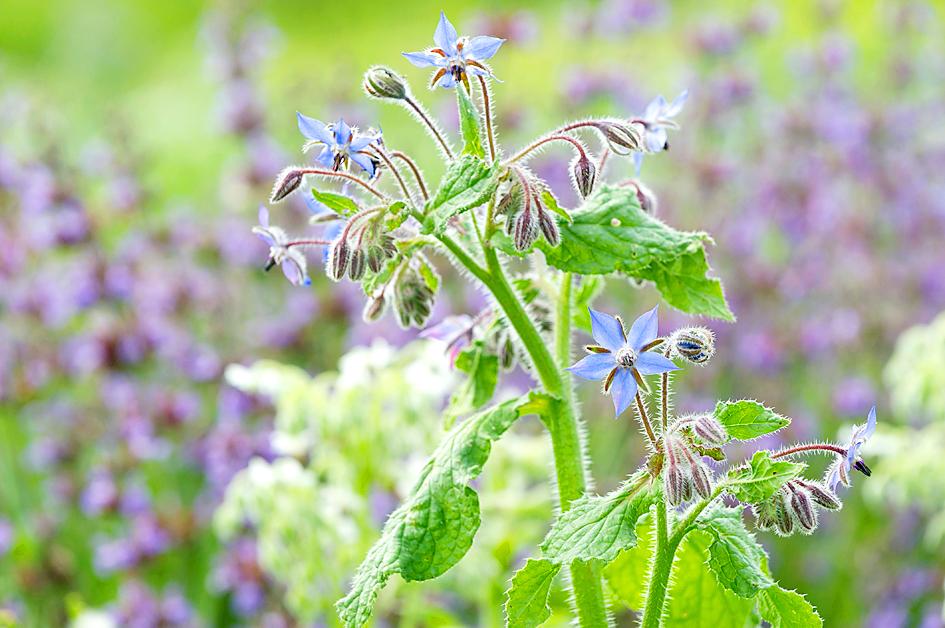A Tunisian entrepreneur growing edible flowers said she is surprised by the appetite for her homegrown product in the North African country and hopes to see a “new culinary culture” bloom.
Sonia Ibidhi, a 42-year-old journalist, turned to organic farming of the niche, but in-demand product “out of love” for working on the land.
Among the flowers she grows are borage, a blue star-shaped flower that tastes like cucumber; chive flowers, purple blossoms with a flavor similar to onion; and nasturtiums, bright yellow to orange flowers with a radish-like taste.

Photo: AP
“I thought the flowers would be for export and of no immediate interest to the local market, but I’ve been surprised by the growing demand, in particular from some top-end hotels,” she said.
After bringing back 42 seed varieties from France, Ibidhi began planting about a dozen types of flowers.
She said that she chose the mountainous Tabarka region in the country’s northwest for its humid climate and abundant fresh water, and now uses her own seeds.
“I do something that I love that is beautiful and colorful,” she said proudly.
She said that she hoped her flowers would spark “a new culinary culture in the country.”
Tunisians already use certain flowers in their traditional cuisine — some sweets feature dried rose petals, while lavender is an ingredient in a spice mix used in couscous recipes.
Yet fresh flowers, which can be used for dishes from soups to salads, as well as teas, are a novelty.
In a hotel in Gammarth, an upscale northern suburb of the capital Tunis, chef Bassem Bizid uses nasturtiums for his fish tartar and accompanies other dishes with a flower-leaf salad or a sorbet garnished with fresh violets.
Clients are “very satisfied to discover something new,” he said.
The hotel’s master chef, Italian Alessandro Fontanesi, said that during the COVID-19 pandemic, the flowers went beyond introducing a new look and flavor.
“Not only are we using a rare Tunisian product, which makes the plate more attractive and adds a special taste, but it can take our clients on a culinary journey,” he said.
Ibidhi launched her business in 2019, after four years of planning.
As well as needing to do an “enormous” amount of paperwork, she said she had to repeatedly explain to the forestry department “what edible flowers were for.”
She sold her car to help finance the business, and later received a grant from the African Development Bank, she said.
She now pays the state 1,400 dinars (US$517) annually to lease five hectares of land, but Ibidhi now fears seeing her business wither.
As well as edible flowers, she has planted a large quantity of strawberries, selling both the fruit and the leaves, which can be used for herbal teas, but the authorities say growing strawberries is in breach of her lease agreement.
Ibidhi said she risks a large financial loss if she were she to uproot them.
“My flowers have become my world,” she said. “I will fight tooth and nail for my project.”

SETBACK: Apple’s India iPhone push has been disrupted after Foxconn recalled hundreds of Chinese engineers, amid Beijing’s attempts to curb tech transfers Apple Inc assembly partner Hon Hai Precision Industry Co (鴻海精密), also known internationally as Foxconn Technology Group (富士康科技集團), has recalled about 300 Chinese engineers from a factory in India, the latest setback for the iPhone maker’s push to rapidly expand in the country. The extraction of Chinese workers from the factory of Yuzhan Technology (India) Private Ltd, a Hon Hai component unit, in southern Tamil Nadu state, is the second such move in a few months. The company has started flying in Taiwanese engineers to replace staff leaving, people familiar with the matter said, asking not to be named, as the

The prices of gasoline and diesel at domestic fuel stations are to rise NT$0.1 and NT$0.4 per liter this week respectively, after international crude oil prices rose last week, CPC Corp, Taiwan (台灣中油) and Formosa Petrochemical Corp (台塑石化) announced yesterday. Effective today, gasoline prices at CPC and Formosa stations are to rise to NT$27.3, NT$28.8 and NT$30.8 per liter for 92, 95 and 98-octane unleaded gasoline respectively, the companies said in separate statements. The price of premium diesel is to rise to NT$26.2 per liter at CPC stations and NT$26 at Formosa pumps, they said. The announcements came after international crude oil prices

STABLE DEMAND: Delta supplies US clients in the aerospace, defense and machinery segments, and expects second-half sales to be similar to the first half Delta Electronics Inc (台達電) expects its US automation business to remain steady in the second half, with no signs of weakening client demand. With demand from US clients remaining solid, its performance in the second half is expected to be similar to that of the first half, Andy Liu (劉佳容), general manager of the company’s industrial automation business group, said on the sidelines of the Taiwan Automation Intelligence and Robot Show in Taipei on Wednesday. The company earlier reported that revenue from its automation business grew 7 percent year-on-year to NT$27.22 billion (US$889.98 million) in the first half, accounting for 11 percent

A German company is putting used electric vehicle batteries to new use by stacking them into fridge-size units that homes and businesses can use to store their excess solar and wind energy. This week, the company Voltfang — which means “catching volts” — opened its first industrial site in Aachen, Germany, near the Belgian and Dutch borders. With about 100 staff, Voltfang says it is the biggest facility of its kind in Europe in the budding sector of refurbishing lithium-ion batteries. Its CEO David Oudsandji hopes it would help Europe’s biggest economy ween itself off fossil fuels and increasingly rely on climate-friendly renewables. While